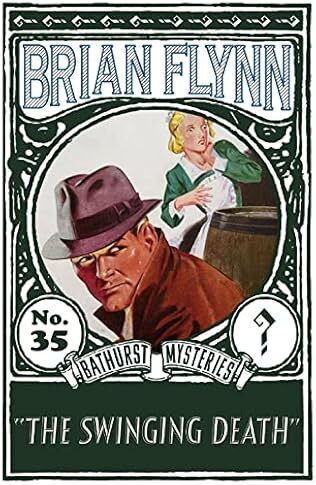The Swinging Death

A review of The Swinging Death by Brian Flynn – 240701
Rather like Anthony Bathurst, Flynn’s serial amateur sleuth attached to the Yard, as he pens a final letter to his professional colleague, Chief Detective-Inspector Andrew MacMorran, at the conclusion of this bewildering case, I had a metaphorical tear in my eye as I reached the last page. The Swinging Death, the thirty-fifth in the series, originally published in 1948 and reissued by Dean Street Press, is the last of the reissued books and the end of a voyage of discovery of an author I have enjoyed immensely. He wrote many more, his last published ten years later, and I hope some enterprising publisher will revive some or all of the rest.
One of the features of Flynn’s work that I have enjoyed is his willingness to experiment and to my mind The Swinging Death has a very distinctive old-fashioned feel about it, as if he wanted to turn the clock back to the pre-WWII days. Even the primary motivation for the murder is rooted in the First World War. Perhaps this was a very clear attempt to turn his back on the gritty realism that was pervading detective fiction at the time.
Nevertheless, there is a gruesome twist as the naked body of Dr Julian Field found hanging from the light fixture in the porch of St Mark’s Church. He had been on a home visit to a patient, the wife of Philip Stanhope, and for some reason, after being seen of at the station by Stanhope, had got off at the wrong station and been murdered. There are other puzzling aspects to the case. Some of Field’s clothing was dumped in the font of St Mark’s while the rest were found in the font of another church. Robbery was not the prime motivation as amongst the few things stolen were a set of keys and Mrs Stanhope’s sputum specimen. At around the time of the murder Mrs Field was allegedly lured from her house which was then ransacked. What on earth was going on and why was Field murdered?
This is a case where there are too many clues, if such a thing can be said, most of which lead nowhere and some that seemingly occupy a lot of attention, such as the identity of Mary with whom Field, it is discovered, was due to have an assignation and a lost set of keys, are rather cavalierly jettisoned along the way. The starting point of the investigation is a reconstruction of Field’s last journey but this is done with a light touch, not the forensic dissection that we would have been treated to by Freeman Wills Crofts, but that too seems to lead to no definitive conclusions.
Amongst the welter of clues there are some that do hint at the real motivation for the crime. There are some initials found in Field’s paying in book, Flynn does like a cryptic clue, a war widow, a photograph taken for a magazine which is canned because the subject objects to something within it, and the doctor’s desire to specialize in lung diseases all take on an especial relevance as the case nears its conclusion. It takes a very astute reader to realise the true significance of it all.
Although Bathurst and MacMorran conclude that they are getting nowhere and abandon the case, Bathurst really knows what happened to Field and why, revealing all over a game of billiards when he invites himself to a family Christmas gathering. The reasons why he does not proceed further are twofold: he recognizes that there is not enough evidence to get a conviction but, more importantly, Field in his opinion is the lowest of the low, a blackmailer who deserved all he got and more. That he was on the right track is neatly confirmed by a brief conversation as he leaves which ties in with the events described in the prologue to the story. Bathurst even teases MacMorran with the truth in a PPS in the final missive.
It would not be a Flynn novel without sporting connotations, poor MacMorran, a football man and a Spurs and Rangers supporter as we discovered in Conspiracy at Angel, has to endure a game of rugby and the pair argue the merits of their respective games. His language is also inventive with the resurrection of the term kittle cattle to describe the actions of a jury especially to be savoured.
Flynn has produced an enthralling plot, one that succeeds in perplexing but makes sense when all the pieces come together. More importantly, it is entertaining and great fun and rounded off a fine series from a writer who has been sadly neglected. I for one shall miss spending time in the company of Bathurst and MacMorran. I could always read them again, I suppose.



